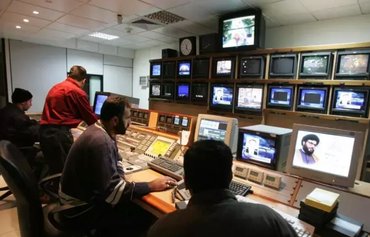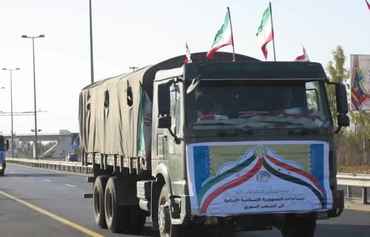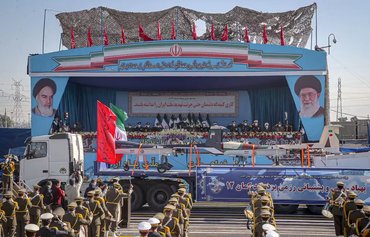ADEN -- The Houthis' military apparatus is on its way to becoming "a very close clone" of the Islamic Revolutionary Guard Corps (IRGC) and Lebanese Hizbullah, a new counter-terrorism study says.
In a study on the Houthi Jihad Council published October 28, the US West Point Military Academy Combating Terrorism Centre (CTC) charts the connection among the Houthis, Lebanese Hizbullah and the IRGC.
With a jihad council modeled on that of Lebanese Hizbullah and the acceptance of an IRGC Quds Force (IRGC-QF) jihad assistant at the heart of its military strategy, it says, the Yemeni group is falling further under Iran's sway.
"Iran sees the Houthis as a remarkable asset, on par with Lebanese Hizbullah, albeit at an earlier stage of development," the report says.
![A Yemeni man holds up pictures of Houthi leader Abdul-Malik al-Houthi (L) and Hizbullah chief Hassan Nasrallah during a Mawlid al-Nabawi ceremony in Sanaa on October 29, 2020. The Houthi group is becoming a clone of Hizbullah and the IRGC, study finds. [Mohammed Huwais/AFP]](/cnmi_am/images/2022/11/15/38646-houthi-nasrallah-600_384.jpg)
A Yemeni man holds up pictures of Houthi leader Abdul-Malik al-Houthi (L) and Hizbullah chief Hassan Nasrallah during a Mawlid al-Nabawi ceremony in Sanaa on October 29, 2020. The Houthi group is becoming a clone of Hizbullah and the IRGC, study finds. [Mohammed Huwais/AFP]
The Houthi-Iran relationship "should no longer be viewed as a relationship of necessity, but rather a strong, deep-rooted alliance that is underpinned by tight ideological affinity and geopolitical alignment", it notes.
"The emergence of a 'southern Hizbullah' is arguably now a fact on the ground."
Modeled on Iran, Hizbullah
The Houthis have drawn heavily on the political and military models of Iran and Lebanese Hizbullah, the report says, noting that "in the formation of the jihad council, the Houthis deliberately adopted Hizbullah's organisation model".
The Houthi Jihad Council "bears an unmistakable similarity to Lebanese Hizbullah's own jihad council, including the centralisation of intelligence and counter-intelligence functions", it says.
Hizbullah developed this council format "in order to communicate lessons learned across the group, and it might reasonably be expected to play this role in Yemen as well", the report says.
"The council might also logically provide a safe, economical and unobtrusive way for the IRGC-QF to advise the Houthi movement," it adds.
"In the acceptance of an IRGC-QF jihad assistant at the heart of Houthi military strategy, the Houthis adopted the same mentoring model as Iraqi terrorist group Kataib Hizbullah," the report says.
"The jihad assistant also decides what kind of Iranian and Hizbullah technical assistance and hardware to provide, both using in-country training teams and stores, or by requesting new specialists or materiel from Iran and Lebanon."
"The Houthi military has adopted many features of IRGC and Lebanese Hizbullah counterparts," including training, covert procurement, military industrialisation, drone and missile forces, and guerrilla naval operations, it says.
It is on its way to becoming "a very close clone of the IRGC and Lebanese Hizbullah military and security systems, with the birth of a Basij-type mobilisation and internal security system already coming into view".
Houthi Jihad Council
There is ample evidence that Houthi leader Abdul-Malik al-Houthi remains distant and rarely, if ever, meets with all members of the jihad council in person, due to security precautions, the CTC report says.
Top advisers Ahmed Mohammed Yahya Hamid and Ahsan al-Humran are the exception.
Hamid is the director of Supreme Political Council president Mahdi al-Mashat's office and the powerful Government Works Authority.
Al-Humran oversees the Houthi intelligence agencies and supervises the group's Ministry of Interior.
The Houthi Jihad Council has a small secretariat, named the Jihad Office, which is led by an al-Houthi loyalist known as Abu Mohammed, in addition to Iranian and Lebanese representatives.
Other council members include an observer from the group's general council, who also represents its executive council, and operations, security, military regions, "jihad preparation" and "special forces" officials.
The operations and military regions officials "assist with operational co-ordination functions across the different geographic military zones", the report says.
The "jihad preparation official" focuses on recruitment, indoctrination and force generation issues.
"Alongside Abdul-Malik, the IRGC-QF 'jihad assistant' and his Lebanese Hizbullah deputy make up a triad at the heart of the Houthi war machine," the report says.
The IRGC-QF uses the same term -- "jihad assistant" -- in Iraq to describe its senior liaison officer with Kataib Hizbullah.
The jihad assistant in Iraq also has a Lebanese Hizbullah deputy, the report says, "suggesting a kind of rough template in IRGC-QF interactions with partners and proxies".
Pawns of the IRGC
The study "reveals the subservience of Abdul-Malik al-Houthi and his circle, who are merely employees of a major department led by the IRGC", Yemeni Deputy Minister of Justice Faisal al-Majeedi told Al-Mashareq.
It shows Iran has taken away the power of decision-making from al-Houthi and his inner circle, he said.
Al-Houthi is merely a member of the organisation overseen by the jihad council, he explained, and IRGC and Hizbullah officials manage all the group's affairs.
Iran also steers and co-ordinates the decision-making processes of the militias it backs in Iraq, Lebanon and Bahrain, he added.
The CTC study proves the Houthis take their orders from Tehran, Abaad Centre for Strategic Studies director Abdul Salam Mohammed told Al-Mashareq.
Even the decision to accept peace is not a Houthi decision "but an Iranian one", he said, blaming the Iranian regime for the war in Yemen, the lack of stability in the region and attacks on the country's infrastructure.
Political analyst Faisal Ahmed said the Houthis have become a powerful tool for Iran, which uses them to carry out military operations against vital infrastructure and shipping lanes in the region.
The IRGC provides its affiliated militias with weapons, money and drugs, supervises their activities and makes decisions about war or peace, he said.

![Yemeni youths march with a portrait of Houthi leader Abdul-Malik al-Houthi on September 20, during a parade commemorating the eighth anniversary of the Iran-backed group's coup in Sanaa. [Mohammed Huwais/AFP]](/cnmi_am/images/2022/11/15/38618-Houthi-leader-Yemen-600_384.jpg)






